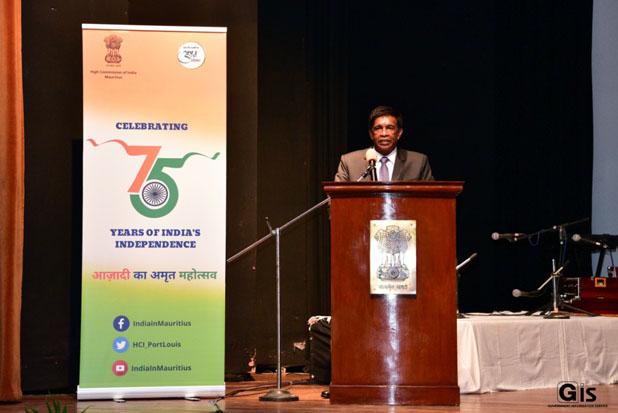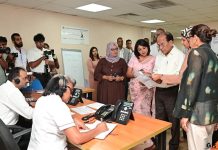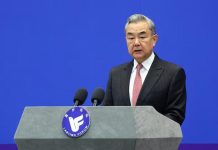Africa-Press – Mauritius. To further develop cooperation between India and Mauritius in the field of traditional medicine and homeopathy, a Memorandum of Understanding was signed for the setting up of an AYUSH (Ayurveda, Yoga & Naturopathy, Unani, Siddha and Homoeopathy) Chair in 2015 during the official visit of the Prime Minister of the Republic of India, Mr Narendra Modi, to Mauritius.
In this context, the Government of Mauritius has decided to set up an AYUSH Hospital at Côte d’Or City in the near future. This announcement was made, this evening, by the President of the Republic of Mauritius, Mr Prithvirajsingh Roopun, at the Indira Gandhi Centre for Indian Culture (IGCIC), in Phoenix.
He was speaking on the occasion of the Ayurveda Day 2021. The Attorney General, Minister of Agro-Industry and Food Security, Mr Maneesh Gobin, the Minister of Health and Wellness, Dr Kailesh Kumar Singh Jagutpal, the High Commissioner of India to Mauritius, Mrs K.
Nandini Singla, and other personalities were also present. In his keynote address, the President recalled that in 1989, the Government of Mauritius set up the National Ayurveda and Traditional Medicine Act in a bid to recognise the use of Ayurveda, Homeopathy, and Chinese traditional medicines.
Since then, he added, the use of Ayurvedic medicine is promoted by the Government through its Traditional Medicine Board and a number of practising Ayurvedic Doctors in Mauritius.
Furthermore, he highlighted that Ayurveda Day is celebrated at national level since the year 2017 by the Association of Ayurvedic Physicians together with the High Commission of India and the IGCIC and aims essentially at creating awareness and promoting the Ayurvedic principles of healing.
Ayurveda, Mr Roopun emphasised, is considered as the oldest healing science which focuses on prevention and treatment of illness through lifestyle practices such as massage, meditation, yoga, dietary changes, and the use of herbal remedies.
As regards the use of Ayurvedic medicines in Mauritius, the President outlined that in 1921, the first Mauritian Ayurvedic Physician, Pandit Ramlukhun Sharma, established Ayurvedic medicines as a means of healing and started an Ayurveda Treatment Centre at New Grove; in 1930, Mr Ramlochun Nathoo started the sales of Ayurvedic medicines in the market of Port-Louis.
He further stressed on the immense contribution of late Dr Deolall Soburrun, the first post-independence Ayurvedic physician and Founder of the Association of Ayurvedic Physicians, who passed away one month ago. Speaking of the Association of Ayurvedic Physicians, President Roopun indicated that it was set up in the year 2000 and comprises 17 members.
The Association, he added, has been instrumental, notably, in the re-opening of Ayurvedic Services in the Ministry of Health and Wellness in 2001 and; in the setting up of an Ayurvedic Therapeutic Committee at the level of the Ministry of Health and Wellness for the control of the importation of Ayurvedic pharmaceuticals in Mauritius.
For his part, Mr Gobin reiterated that his Ministry will collaborate as much as possible with the concerned stakeholders to promote the use of traditional Ayurveda medicines in Mauritius. He also announced the launching of a comic book on Ayurveda for children and the youth on this occasion.
This publication, he stated, is an initiative of the Ministry of AYUSH in India and has been printed locally in a small booklet format, with the collaboration of the High Commission of India, as the printed materials could not have been imported because of setbacks due to COVID-19 pandemic.
For Dr Jagutpal, Mauritius has the ideal environment for Ayurveda medicine to flourish as the internationally acclaimed specialist in the field of medicinal plants, Dr Mayaram Uniyal, during his visit to Mauritius, identified some 400 local species that could be useful in Ayurvedic treatment.
The Minister also enumerated certain ways in which the use of Ayurveda is promoted through his Ministry. These include: the operation of six Ayurvedic centres notably at: the Belvedere Mediclinic; La Source Ayurvedic Clinic in Flacq; the Sir Seewoosagur Ramgoolam National Hospital in Pamplemousses; Victoria Hospital in Candos; L’escalier Mediclinic; and Plaine Verte Mediclinic.
Each of these units, he added, has a ‘Panchkarma’ Unit where therapeutic massage is provided to the public. Furthermore, eight Ayurvedic Medical Officers are currently employed at the Ministry and the Ayurvedic centres have a yearly attendance of around 60 000 patients.
It is thus an undeniable fact that Ayurveda has its place in our Public Health System, the Health Minister indicated. For her part, the High Commissioner of India to Mauritius underlined that Ayurveda is a health practice with strong historical and cultural roots as it was developed by physicians who studied the complex relationship between nature and humans.
Ayurveda has stood the test of time and has today become a way of life for many across the world, especially during the COVID-19 pandemic era, Mrs Singla pointed out.
In addition, she indicated that Ayurveda originates from prehistoric times and was developed during the Vedic Period and is still widely used in the present days to maintain health, reduce stress, and strengthen the immune system.
For More News And Analysis About Mauritius Follow Africa-Press







